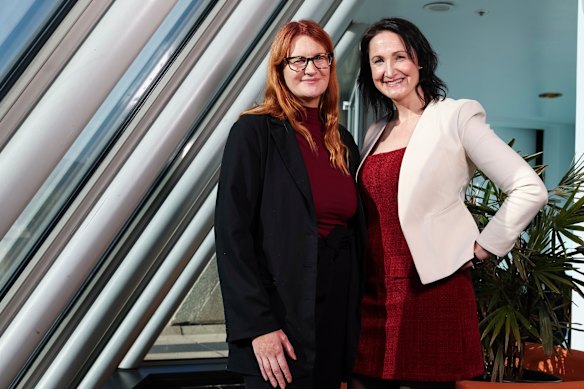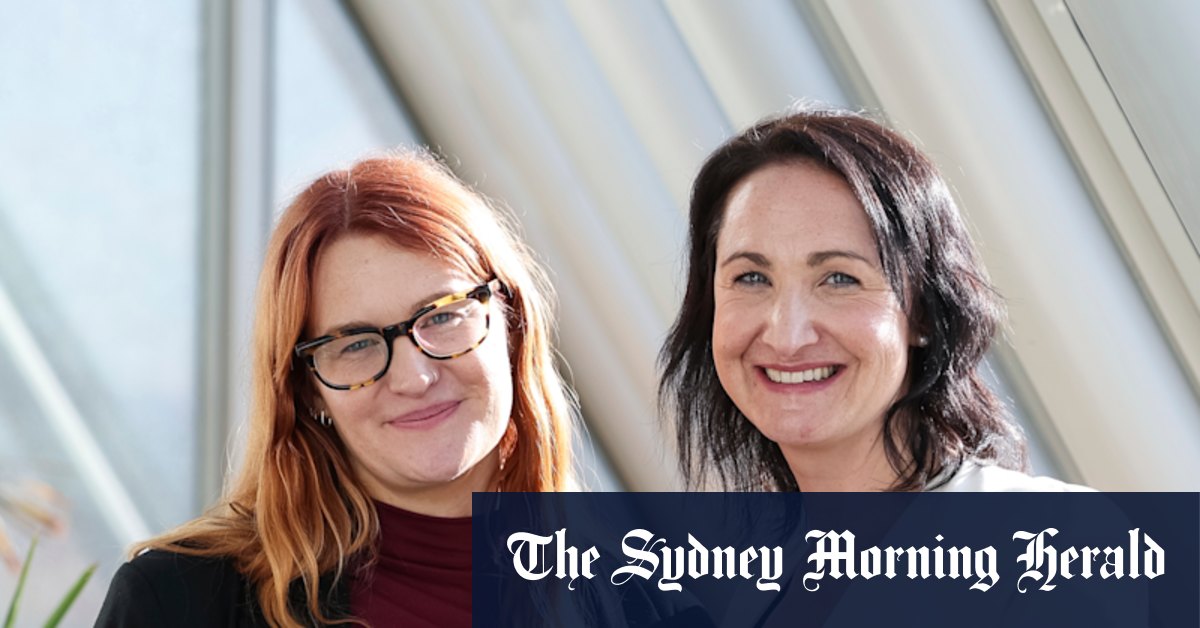“It was a bit of a shock. But they went through everything in a lot of detail, and I was sent all this stuff that I needed to take to my GP. The information I was given was very helpful.”
The researchers found that one in 50 of their participants – aged between 18 and 40 – had a high genetic risk of breast cancer and ovarian cancer, prostate cancer, colorectal cancer or heart disease.
Bellette was one of those individuals. Specifically, researchers found a variant of the BRCA2 gene, which is linked to far higher rates of breast and ovarian cancer in women.
For the Tasmanian, everything was starting to fall into place. Her mother’s breast cancer, when it was discovered, had already spread to her ribs in between regular mammogram appointments.
Bellette was determined for the same thing not to happen to her. In March this year, she had a prophylactic bilateral mastectomy – the surgical removal of both breasts – followed by what’s called a DIEP flap reconstruction, a type of breast reconstruction using the patient’s own tissue from another part of the body.
Loading
“I had it all through the public system. It didn’t cost me anything. I was shocked at how quick I got in – I think I waited 90 days and then had my surgery.
“The first surgery was 13 hours. But I healed really well. You wouldn’t even know now. I feel great.”
Bellette says she’s incredibly grateful to have been able to take part in the study, which is currently undergoing peer review. The Tasmanian had not been eligible for genetic testing through Medicare, even though her mother was receiving cancer treatment, because that cancer had not yet been linked to inherited risk.
“I’ve been able to control what happens,” Bellette says. “My mum’s family is also huge, so there’s so many aunties and uncles now getting tested. It’s probably going to prevent a lot of people from possibly getting cancer.”
Monash University’s Dr Jane Tiller, the study’s co-lead, said Bellette’s story illustrated why Australia needed to widen access to publicly funded genetic testing for certain diseases.
“We want to find people ahead of time,” Tiller says.
“We would like to test 100,000 people and look at the evidence on how we roll this out to the broader population, in the future, as a DNA screening program.”

Bellette flew to Canberra last week to speak to politicians about her experience. She is pictured here with Dr Jane Tiller from Monash University.
Credit: Alex Ellinghausen
Tiller stressed that while people might be desperate to find out their personal genetic information, it was important for publicly funded DNA screening to focus on conditions that are very high risk and treatable if caught early enough.
Otherwise, researchers run into ethical issues, such as the effects on someone’s mental health if they learn they have a very high risk of developing early onset dementia, but there is nothing that can be done to prevent it.
Alongside the BRCA1/2 genes, Tiller would like the federal government to expand access to genetic testing for Lynch syndrome – associated with higher risks of bowel cancer, endometrial cancer and ovarian cancer – and familial hypercholesterolemia, linked to genetic high cholesterol and risks of heart attack from an early age.
“Young people want to take preventative steps for their health. We would rather that be through a publicly funded screening program than people getting dodgy genetic tests from overseas because they can’t get them at home.”
The University of Sydney’s Dr Brooke Nickel, who is not associated with Tiller’s research and has previously written about the risks of overdiagnosis, said a genetic testing regime that was too broad had the potential to pile additional pressure on the health system’s limited resources.
“I think it is really important to focus testing where it really makes a difference,” Nickel said.
During the previous term of parliament, the Albanese government promised to stop life insurance companies from using DNA screening results to discriminate against customers. That draft legislation is now expected to come before MPs in the coming months.
Loading
A spokesperson for Health Minister Mark Butler said the Department of Health, Disability and Ageing was reviewing Monash University’s expanded DNA screening proposal.
In the meantime, Bellette’s surgical journey isn’t finished.
“I’ll get my ovaries out when I’m 40, and that should be the last surgery that I need.”
She also wants to be a role model for her two daughters.
“It’s a 50-50 chance they could carry the gene. When they’re 18, they can choose to do the testing and take action if they wish to.”
Start the day with a summary of the day’s most important and interesting stories, analysis and insights. Sign up for our Morning Edition newsletter.

